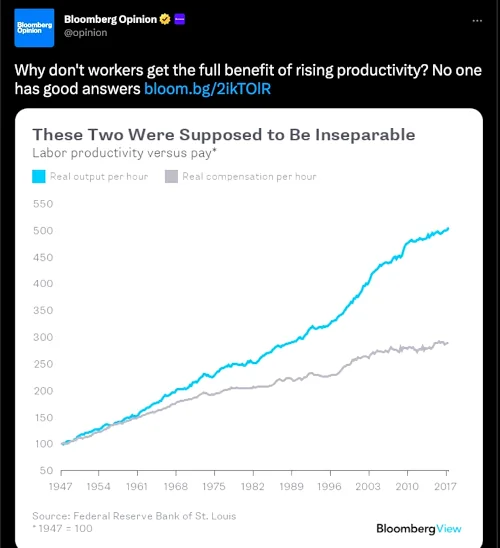The link between increasing wages through productivity has been a subject of debate among economists, especially in western Nations.
Millennials, or people born between the early 1980s and the mid-1990s, have faced a number of financial challenges in today’s economic environment. From student loan debts to the high cost of living, stagnant wages, lack of job security, and economic downturns. Consequently, many have agreed that solutions are needed. However, from a political perspective, how the issue is delt with varies depending on which side of the political spectrum you sit on.
Student loan debt has become a point of contention in the political arena. The ever-increasing cost of education has left millennials under a mountain of burdening debt. Thereby, presenting challenges that can hold them back from reaching other financial goals. Some have argued that the alternative solution to this is looking at other educational options such as trade schools with skills that provide a decent to high pay grade.
Politicians Get Vocal About Millennial’s Economic Environment
Democrat Ideas:
In the past, politicians have been vocal about their solutions. Senator Bernie Sanders has been a vocal advocate for millennials and has called for policies to address their economic struggles. He has supported measures such as free college tuition, a $15 minimum wage, and universal healthcare, which he argues would help alleviate some of the financial challenges facing young people. Unfortunately, some of his solutions are not altruistic, such as universal healthcare. As a result, it is commonly known that the cost of universal healthcare will be passed down to the American taxpayers.
Representative Ocasio-Cortez has called for policies such as student loan forgiveness and higher taxes on the wealthy to help address income inequality. However, these points have not been taken with open arms by both sides of the political parties. As a result, in some cases it has even become a point of contention between Republicans, Democrats and the American electorate on both sides of the political spectrum.
Republican Ideas:
On the other side of the political isle, the Republicans have tried their own methods of economic improvements for millennials and small businesses in an attempt to improve the economic outcomes for this age group. Senator Marco Rubio has been a vocal advocate and has called for measures such as expanding the child tax credit and creating new tax incentives for small businesses, which he argues would help promote economic growth and provide greater opportunities for young people.
Senator Mitt Romney has focused on issues such as job training and workforce development as a means of addressing economic challenges facing young people. He has proposed measures such as increasing access to apprenticeships and vocational training programs, which he argues would help provide young people with the skills and education they need to succeed in the modern economy.
Former President Trump has called for measures such as tax cuts and deregulation as a means of promoting economic growth and creating job opportunities for young people. He has also emphasized the importance of trade policies that prioritize American workers and businesses.
Other Financial Challenges Facing Millennials
There are other financial challenges that Millennials are facing today that are limiting their abilities and capacity for success such as:
- High cost of living
- Stagnant wages
- Lack of job security
- Economic Downturns
Productivity VS Wages
The link between increasing wages through productivity has been a subject of debate among economists, especially in western Nations. Generally, productivity is a measure of the output of goods or services that are produced per unit of labor or input, while wages refer to the compensation paid to workers for their labor.
Historically, productivity and wages have tended to rise together, as technological advancements and improvements in efficiency led to higher output, which in turn supported higher wages. However, in recent years, there has been a growing disconnect between rising productivity and stagnant wages, particularly in developed countries like the United States. Millennials have noticed this and are bringing many conversations to this topic.

Millennial Wages Don’t Seem to Benefit from Productivity
There are several factors that may contribute to the trend in recent decades between productivity and wages. One possible explanation is that the gains from productivity improvements are not being evenly distributed across the economy. Rather, they are accruing disproportionately to high-skilled workers and business owners, while low- and middle-skilled workers are seeing little benefit.
Another possible explanation is that globalization and increased competition from low-wage countries have put downward pressure on wages in developed countries, making it difficult for workers to negotiate higher wages even as productivity rises.
In addition, increased automation and the gig economy may be a contributing factor. As a result, these new capabilities, and industries respectively, have molded the structure of work and the labor market. Thereby, contributing to the disconnect between productivity and wages. These changes may be reducing the bargaining power of workers and making it easier for employers to keep wages low, despite increases in productivity.
Overall, the relationship between productivity and wages is complex and multifaceted, and there is no single explanation for why rising productivity is not necessarily translating into higher wages for workers.
Related Links: Visit our Lifestyle Writers and Content
Solutions for Millennials
Financial advisors and economists all differ in what solutions may be deployed by millennials. They range from some of the following:
- As it relates to the cost of living, avoid moving into urban areas where the cost of living has grown exponentially.
- Buying a home in remote locations can reduce your homeownership cost while you take advantage of work-from-home remote jobs.
- If you can’t acquire a decent-paying job with growth potential, get any job in the meantime, while you grow a business, so that you don’t limit your earning potential.
- Search for decent-paying trade jobs and take time for trade schools and tech training that provide certificates with Fortune 500 to Fortune 5000 companies.
- Search for jobs where demand is high, but the labor supply is low to limit your competition.
Don’t let vanity and the glamorous trends of the day that can increase your cost of living lead your decisions towards urban areas. Many have built families in decentralized areas where the traditional home and land can still be acquired.
Questions, comments or if you want to advertise locally in the People’s Olive Branch, reach out to us at peoplesolivebranch@protonmail.com














